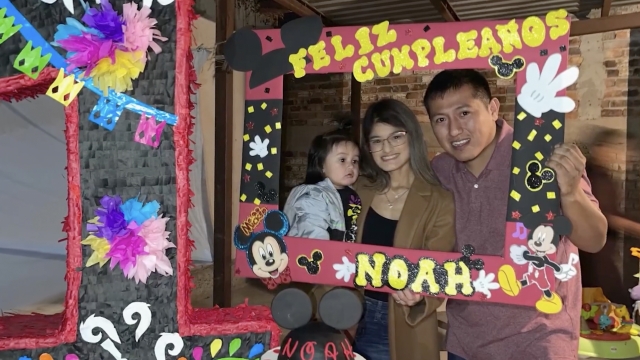Yarianna Martinez and her infant son Noah have a gap in their lives.
"This isn’t home to me, it’s missing a big part of our lives. It's now just a house," said Martinez.
Their lives are contained in uncertainty, with Martinez's husband stranded hundreds of miles away.
"I actually spoke with him today. He cried on the phone because of a video of our baby I sent to him," she said.
Scripps News visited Jaime Avalos, who’s stuck in legal limbo, in Juarez, Mexico, a notoriously unsafe border city.
"I had this feeling, I told my wife before we came, I’m gonna stay in Mexico. They’re gonna deny it," said Avalos.
All but for US citizenship, Avalos is as American as apple pie.
"Spanish is a little harder. Certain words, I can speak it but I’m not fluent," he said.
He grew up in Houston, Texas, where he built a life and family.
"I have my life over there. Everything had to change overnight. I have a house that might lose, a house for my kid that is going to be gone," Avalos said.
He’s a recipient of Deferred Action for Childhood Arrivals,or DACA. Avalos, a Mexican national, thought he arrived in the U.S. as a 1-year-old. In August 2022, at the age of 28, he intended to begin a pathway to US citizenship — but it turned into a road to nowhere.
"They pulled my birth certificate. They gave me everything else, but my birth certificate. That’s when she asked, 'Are you 100% sure you never came back to Mexico?'" said Avalos.
His previous lawyers told him to apply for a visa at the US Consul General in Juarez. His wife, a natural-born American, could sponsor him. But there, officials revealed information he says he never knew.
"They denied him for the simple fact that we didn't know that in 2002, they took him back to Mexico to register his adoption under his stepfather's last name," Martinez said.
Avalos’ mother took him across the border when he was 6 or 7, which he says he doesn’t remember. It was to get records for his adoption to a man he always thought was his biological father. Avalos called it a double gut punch.
"And they were just like, 'There's nothing you can do. Just turn in the paperwork. So basically, say this, turn everything and if we deny you, OK, you’re on your own,'" Avalos said.
Under U.S. immigration law, if you cross into the country illegally, leave and re-enter, you’re barred from returning for 10 years. There are no exceptions, not even for children.
Avalos’ family got a new attorney, who called his Congressman for help.
"The first thing that we have to conclude is that we're talking about three people, not just a person," said Rep. Al Green.
Rep. Green says Avalos’ best shot at coming home is appealing to the Department of Homeland Security for an exemption called "humanitarian parole." The Texas Democrat has appealed on his behalf.
"And he went there to get a visa so that he could come back into the country lawfully, under the advice of people who were capable, competent, qualified and assumed that this was an appropriate thing to do," Green said.
Green adds this is a textbook example of how law-abiding people can quickly fall through the cracks of immigration law.
"The laws are such that they have to be changed, and changing the laws will require doing something more than building a wall," Green said.
The family currently celebrates life’s milestones in brief trips back and forth to Mexico.
"It breaks our heart because Noah is getting to the age where he’s starting to recognize, 'Hey, I just saw you in person and now I'm just seeing you on FaceTime. Why aren’t you here? Why aren’t you playing with me?'" Martinez said.
For now they’re in separate countries. The bills Avalos used to cover as a contractor in the U.S. are piling up and he can’t provide.
"It is really stressful because, well, I don't see her. I used to see her every morning; kiss her every morning. Now I just go to sleep. It's just me by myself. I can't see my baby. I can't touch him all the time. I want to. I miss him. He talks a lot more, so I'm missing that," Avalos said.
They hope Uncle Sam will re-open the door to their American dream.



